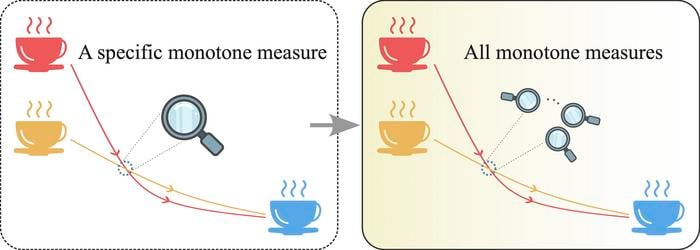A counterintuitive physical phenomenon that has puzzled scientists for millennia may have finally met its mathematical match. Researchers at Kyoto University have developed a universal framework to explain the mysterious Mpemba effect – where hot systems sometimes cool faster than cold ones under identical conditions.
First observed by Aristotle over two millennia ago and later rediscovered by Tanzanian student Erasto Mpemba while making ice cream in a cooking class, this peculiar thermal behavior has defied consistent explanation despite decades of research.
The challenge has been one of measurement – how do you definitively prove something cools “faster” when the very concept of “faster” depends on your measuring technique?
“Our study proves that the use of thermomajorization is equivalent to considering all monotone measures simultaneously,” explains corresponding author Tan Van Vu from Kyoto University, whose team’s findings were published March 10 in Physical Review Letters.
This mathematical breakthrough offers the first universal criterion for determining when the Mpemba effect is truly occurring, eliminating the ambiguity that has plagued previous studies. Until now, researchers had to select specific ways to measure cooling rates, leading to inconsistent results – what appeared to be the Mpemba effect using one measure might vanish when using another.
The phenomenon gained scientific recognition in 1963 when Mpemba noticed that hot ice cream mix froze faster than cold mix. Working with British physicist Denis Osborne, he documented this behavior in water, sparking decades of scientific investigation. While initially observed in water, researchers have since found the effect in various systems, including microscopic ones.
What makes the Kyoto researchers’ work particularly significant is their application of thermomajorization theory – a mathematical framework that unifies different measurement approaches. By adopting this perspective, they’ve established a rigorous foundation for evaluating thermal relaxation speed that works across all possible measurement techniques.
Perhaps most surprisingly, their work revealed that the effect isn’t limited to specific temperature ranges as previously thought.
“This surprising result suggests that the Mpemba effect reflects a more universal underlying mechanism than previously thought,” Vu notes in the research announcement.
On a practical level, understanding this phenomenon could lead to improvements in cooling technologies and heat engines. The research may also have implications for quantum computing and biophysics, where thermal relaxation plays important roles.
While the work represents a major theoretical advance, questions remain. The researchers point out that determining “the minimum timescale at which the thermomajorization Mpemba effect can occur” is a crucial next step that could establish fundamental constraints on how quickly systems can relax to equilibrium.
For everyday people who’ve debated whether hot water really does freeze faster in their ice cube trays, the research offers mathematical validation that in certain circumstances, what seems impossible is not only possible but predictable. Sometimes in physics, as in life, the counterintuitive path is the faster one.
If our reporting has informed or inspired you, please consider making a donation. Every contribution, no matter the size, empowers us to continue delivering accurate, engaging, and trustworthy science and medical news. Independent journalism requires time, effort, and resources—your support ensures we can keep uncovering the stories that matter most to you.
Join us in making knowledge accessible and impactful. Thank you for standing with us!

